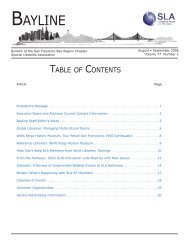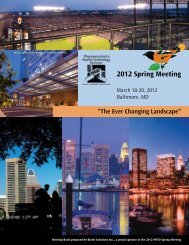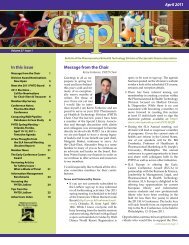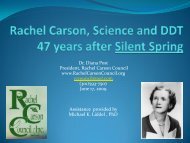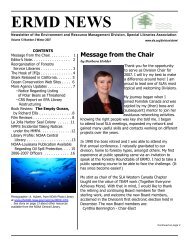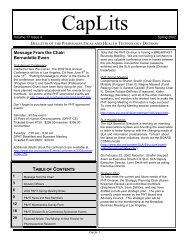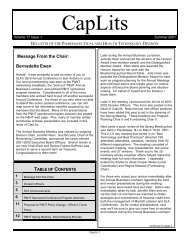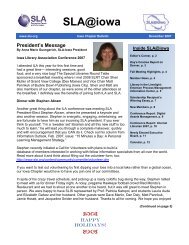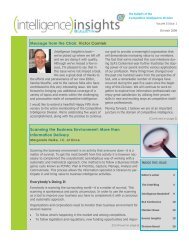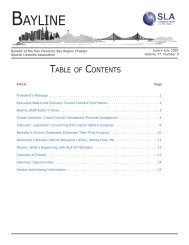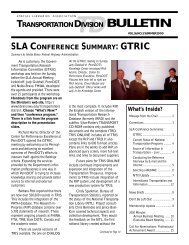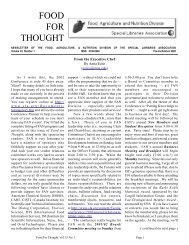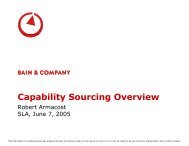Message from the Chair In this issue Spring 2012 - units.sla.org ...
Message from the Chair In this issue Spring 2012 - units.sla.org ...
Message from the Chair In this issue Spring 2012 - units.sla.org ...
Create successful ePaper yourself
Turn your PDF publications into a flip-book with our unique Google optimized e-Paper software.
CapLits – <strong>Spring</strong> <strong>2012</strong><br />
Left Coast Medical Communications Annual Meeting, January 27, <strong>2012</strong><br />
This meeting, which was well represented by Medical Communications/Medical<br />
Affairs people <strong>from</strong> <strong>the</strong> different pharmaceutical<br />
and biotech companies in California, covered<br />
topics on <strong>In</strong>novations and Technology (Med Comm), Comparative<br />
Effectiveness Research and interaction with Field<br />
Personnel. There was also a discussion on <strong>the</strong> latest FDA<br />
Guidance on unsolicited requests. There were two things of<br />
particular interest to <strong>In</strong>formation Specialists that I would like<br />
to share with you.<br />
<strong>In</strong> <strong>the</strong> panel on <strong>In</strong>novation and Technology, Suzana Griffin <strong>from</strong><br />
Amgen mentioned <strong>the</strong> importance of literature surveillance in<br />
Medical Communications. She said that previous use of contract<br />
professionals to monitor Literature Alerts did not completely<br />
meet <strong>the</strong>ir information needs. They now have a contract with<br />
WebMD which provides <strong>the</strong>m not only with timely, relevant<br />
articles but also an added blinded expert opinion. This helps<br />
<strong>the</strong>m with <strong>the</strong>ir internal training needs and continuing education.<br />
<strong>In</strong> <strong>the</strong> same panel, Rick Kulkarni <strong>from</strong> WebMD described<br />
<strong>the</strong> mechanism by which <strong>the</strong>y select <strong>the</strong> articles. WebMD has<br />
identified about 300 core journal titles that are relevant to <strong>the</strong><br />
subject of interest and <strong>the</strong>y monitor <strong>the</strong>m for important articles.<br />
Once <strong>the</strong> articles are selected <strong>the</strong>y are sent to a core set of KOLs<br />
(Key Opinion Leaders, such as prominent authors and so on)<br />
who <strong>the</strong>n give <strong>the</strong>ir opinion of <strong>the</strong> paper. These KOLs are<br />
blinded for Amgen. Rick also mentioned that Amgen was <strong>the</strong>ir<br />
first corporate venture. Of course relevant pricing is not shared<br />
and probably will not be affordable by many. When Suzana<br />
was asked specifically why she was not using <strong>the</strong> <strong>In</strong>formation<br />
Specialists, she mentioned that <strong>the</strong>re were delays in receiving<br />
articles and sometimes important articles were missed. Also<br />
<strong>the</strong> expert opinion was an added value that <strong>the</strong>y found with<br />
WebMD. <strong>In</strong> talking to Rick who is an MD, it was very apparent<br />
that he was not aware of services like Faculty of 1000 nor<br />
24<br />
had he thought about partnering with <strong>In</strong>formation Specialists.<br />
This discussion made me wonder if doing relevant and specific<br />
searches and alerts using aggregate vendors for clinical<br />
departments diminishes in value due to <strong>the</strong> tardiness of <strong>the</strong><br />
information getting into <strong>the</strong> vendor databases. I also wonder<br />
if adding an internal subject expert to analyze key scientific<br />
articles would be one way of increasing our value to <strong>the</strong>se<br />
departments.<br />
The o<strong>the</strong>r information that would be of interest to us, might<br />
affect some of us and where we might be able to have a say<br />
concerns one of <strong>the</strong> guidance outlined in <strong>the</strong> new FDA Guidance<br />
on Unsolicited Requests. The Guidance can be found at<br />
http://www.fda.gov/downloads/drugs/guidancecomplianceregulatoryinformation/guidances/ucm285145.pdf.<br />
<strong>In</strong> talking<br />
about responses <strong>from</strong> Medical Communications, line 268 of<br />
<strong>the</strong> document states that “The response should include complete<br />
copies of scientific reprints, technical literature, or o<strong>the</strong>r scientific<br />
and medical information responsive to <strong>the</strong> request, not just summary<br />
documents or abstracts prepared by <strong>the</strong> firm.” Medical Communications<br />
Responses, such as Standard Response Letters,<br />
Unique Response Letters, usually contain a list of references<br />
at <strong>the</strong> end of each document. This list can often be very long.<br />
Currently companies provide reprints only when <strong>the</strong> health<br />
care provider requests it. If <strong>this</strong> guidance goes into effect <strong>the</strong>n,<br />
even though <strong>the</strong> language here says “should” (which by <strong>the</strong><br />
FDA’s own definition is not binding), reprints should always<br />
accompany <strong>the</strong> letters. The attendees at <strong>the</strong> conference mentioned<br />
that failure to do so could result in a warning letter by<br />
<strong>the</strong> FDA as it has done so in <strong>the</strong> past. This becomes an <strong>issue</strong><br />
as <strong>the</strong> costs associated with getting reprints, and <strong>the</strong> appropriate<br />
copyright permissions could be very large. The costs for<br />
reprints and copyrights are often absorbed by <strong>the</strong> Med Comm<br />
departments in many companies. However, in o<strong>the</strong>r companies<br />
where <strong>the</strong> library is still a big presence, <strong>the</strong> costs are absorbed<br />
by <strong>the</strong> Library/<strong>In</strong>formation Center.<br />
Iris Tam <strong>from</strong> Genentech mentioned that <strong>the</strong>re<br />
has been a precedence in a previous guidance<br />
(for commercial purposes) where a year after<br />
<strong>the</strong> guidance went into effect, <strong>the</strong> language<br />
“scientific reprints should be given” was<br />
qualified with “upon request.” As <strong>the</strong> FDA<br />
is accepting feedback on <strong>this</strong> new Guidance<br />
until <strong>the</strong> middle of March, it was suggested<br />
that everyone ask <strong>the</strong>ir Regulatory departments<br />
to let <strong>the</strong> FDA know that <strong>the</strong>y would<br />
like <strong>the</strong> language “Scientific Reprints should<br />
be given” to be qualified by “upon request.”<br />
I wanted to share <strong>this</strong> with you so that all of<br />
you can look into <strong>this</strong> and give <strong>this</strong> feedback<br />
to <strong>the</strong> appropriate person in your Regulatory<br />
Department. If <strong>the</strong> FDA hears <strong>from</strong> a lot of<br />
people <strong>the</strong>n <strong>the</strong>re will be a greater chance of<br />
<strong>the</strong> language being changed and budgets not<br />
being drastically affected.<br />
Praveena Raman



